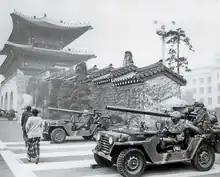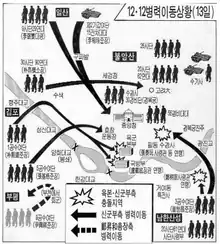 Gwanghwamun on December 13, 1979 | |
| Date | December 12, 1979 |
|---|---|
| Location | Seoul |
| Also known as | 12.12 Military Insurrection |
| Participants | Hanahoe (including Chun Doo-hwan, Roh Tae-woo) |
| Outcome | Fifth Republic of Korea, Chun Doo-hwan became the 11th president of the Republic of Korea |
| History of South Korea |
|---|
 |
|
|
The Coup d'état of December Twelfth (Korean: 12.12 군사반란; Hanja: 12.12 軍事叛亂) or the "12.12 Military Insurrection" was a military mutiny which took place on December 12, 1979, in South Korea.
Republic of Korea Army Major General Chun Doo-hwan, commander of the Defence Security Command,[1] acting without authorization from Acting President Choi Kyu-hah, ordered the arrest of General Jeong Seung-hwa, ROK Army Chief of Staff, on allegations of involvement in the assassination of former President Park Chung Hee.

After Jeong's capture, 29th Regiment of the 9th Division, along with the 1st Special Forces Brigade and 3rd Special Forces Brigade, invaded downtown Seoul to support the 30th and 33rd Capital Security Group loyal to Chun, then a series of conflicts broke out in the capital. Two of Jeong's allies, Major General Jang Tae-wan (Commander of Army Capital Security Command) and Major General Jeong Byeong-ju (Commander of Army Special Warfare Command ), were also arrested by the rebel troops. Major Kim Oh-rang, aide-de-camp of Jeong Byeong-ju, was killed during the gunfight.
By the next morning, the Ministry of Defense and Army HQ were all occupied. Chun and his fellow 11th class of Korea Military Academy graduates, such as Major General Roh Tae-woo, commanding general of 9th Infantry Division, and Major General Jeong Ho-yong, were in charge of the Korean military. Chun was supported in the coup and the subsequent consolidation of power by the powerful private club of military officials called Hanahoe.
The Coup d'état of December Twelfth and the Coup d'état of May Seventeenth ended the Fourth Republic of South Korea and led to the establishment of the Fifth Republic of South Korea. The coup, alongside the Gwangju Massacre, is the primary justification of Chun's 1995 arrest by the Kim Young-sam administration.
Cultural references
Film
- 12.12: The Day (2023)[2]
Television
- 4th Republic (1995-96)[3]
- 5th Republic (2005)[4][5]
- Koreagate (1995)[6]
See also
References
- ↑ "기무사 '37년 소격동시대' 마감… 과천 이전". The Dong-A Ilbo (in Korean). 19 November 2008. Retrieved 11 December 2022.
- ↑ "[영화는실화다] 영화 '서울의 봄'_ 12·12 군사 반란" [[The movie is a true story] Movie '12.12: The Day'_ December 12 Military Uprising]. YTN (in Korean). 24 November 2023 – via Naver.
- ↑ "<방송> MBC「제4공화국」12.12사태 재현" [Broadcast MBC「Fourth Republic」Reenactment of the December 12 Incident]. Yonhap News Agency (in Korean). 31 October 1995. Retrieved 24 November 2023 – via Naver.
- ↑ "'제5공화국', 12.12 장면 방송에도 시청률 하락" ['The Fifth Republic', viewership ratings drop even after the December 12 scene was broadcast]. Yonhap News Agency (in Korean). 16 May 2005. Retrieved 24 November 2023 – via Naver.
- ↑ "12·12 다룬 '서울의 봄'과 '제5공화국' ...뭐가 같고 뭐가 다른가" ['12.12: The Day' and '5th Republic', both of which were covered on Coup d'état of December Twelfth... What's the same and what's different?]. Ilyo Shinmun (in Korean). 29 November 2023. Retrieved 30 November 2023.
- ↑ "許和平의원,'제4공화국'.'코리아게이트' 고소" [Rep. Heo Wha-pyeong sues the '4th Republic' and 'Koreagate']. Yonhap News Agency (in Korean). 7 December 1995. Retrieved 24 November 2023 – via Naver.